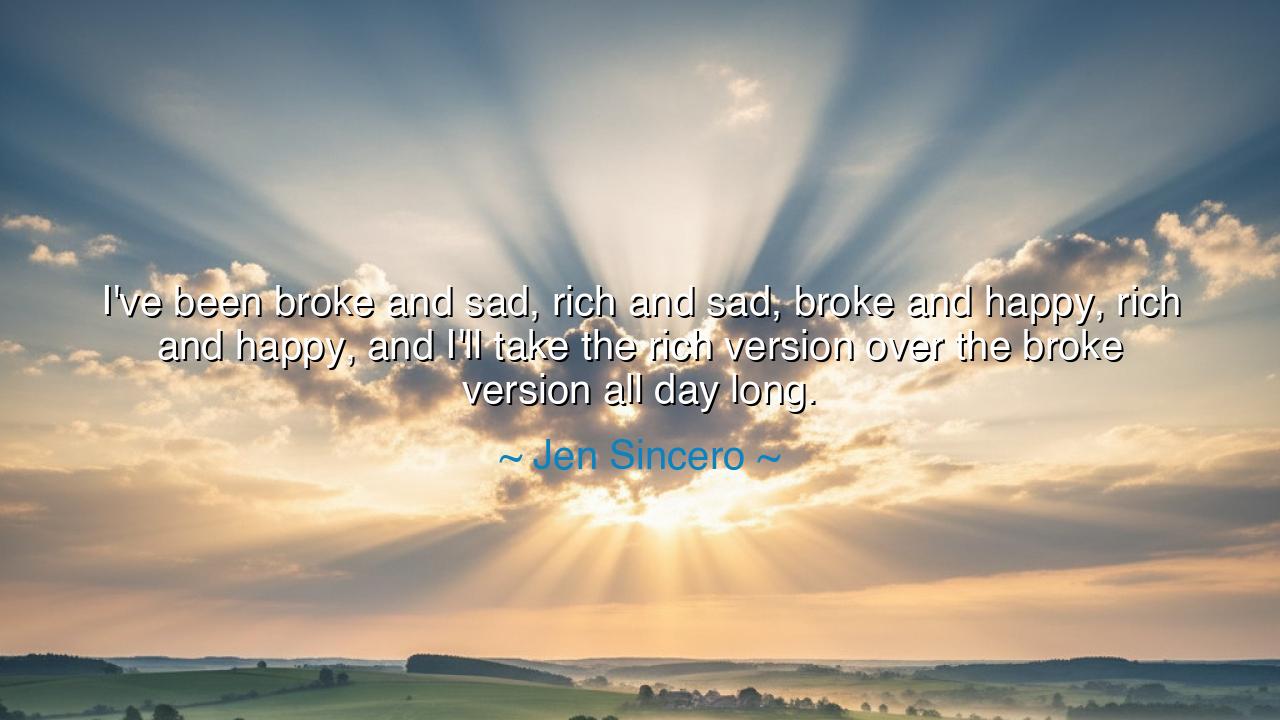
I've been broke and sad, rich and sad, broke and happy, rich and
I've been broke and sad, rich and sad, broke and happy, rich and happy, and I'll take the rich version over the broke version all day long.






Hear the voice of Jen Sincero, who has walked both valleys and peaks, and who declares with clarity: “I’ve been broke and sad, rich and sad, broke and happy, rich and happy, and I’ll take the rich version over the broke version all day long.” In these words is not the boasting of wealth, but the wisdom of one who has tested both poverty and prosperity, sorrow and joy, and who has learned that while neither riches nor poverty guarantee happiness, abundance offers a greater strength with which to face life’s storms.
The heart of her saying is this: money is not the source of happiness, but it is the foundation of freedom. One may be sad whether rich or poor, for sadness dwells in the spirit, not in the purse. Yet to suffer sorrow in scarcity is to be pressed doubly, by both inner anguish and outer lack. To be rich and sad is still to have the cushion of choice, the ability to heal, to travel, to rest. To be broke and sad is to be struck by hardship on every side. Thus she proclaims with honesty: when all else is equal, let it be the rich version.
The ancients knew this same truth. Seneca, the Stoic philosopher, declared that wealth itself is indifferent, but its use may aid virtue. He himself was rich yet taught that true happiness comes from wisdom, not gold. Still, even he admitted that poverty strains the soul, pulling one’s thoughts away from higher matters and binding them to survival. So too does Sincero’s insight align with this eternal wisdom: joy springs from within, yet wealth can clear the ground in which joy may grow.
Consider also the tale of Andrew Carnegie, who was born into poverty in Scotland, working from childhood in factories. He knew the bitterness of hunger and the weariness of endless toil. Yet as he grew into wealth, he discovered both freedom and responsibility. With abundance, he built libraries, schools, and opportunities for others, shaping the future of countless souls. His life reveals what Sincero’s words teach—that wealth does not erase sorrow, but it empowers creation and service.
Her statement is not without its tension. Some may say, “Does not wealth corrupt?” And indeed, history is full of those who, rich and ungrateful, fell into ruin. But Sincero does not preach worship of riches; she merely proclaims preference. Between broke and rich, between struggle and provision, she has lived both, and she chooses the path where burdens are lighter and opportunities greater. Her words free us from false holiness that glorifies poverty as virtue in itself, reminding us that there is no shame in desiring plenty.
The lesson for us, O children of tomorrow, is clear: seek inner joy first, but do not scorn outer abundance. Happiness alone does not pay for shelter, nor does laughter alone feed the hungry. Money is a tool—neutral in itself, powerful in its use. If you must face life’s trials, face them with resources at your side. If you must build, build with the stone of joy and the mortar of provision.
Practical wisdom calls to us: do not worship wealth, but pursue it with honor, knowing it multiplies your choices. Cultivate gratitude whether in scarcity or plenty, yet also cultivate diligence, so that you may rise beyond mere survival. When abundance comes, use it not only for your comfort but for the service of others, so that your prosperity may ripple outward as blessing.
Thus let Sincero’s words echo as an enduring truth: sorrow and joy visit both the rich and the broke, but when the road is hard, let it be traveled with strength and not with emptiness. Strive not merely for wealth, nor merely for happiness, but for the union of both—for in that union lies the power to live fully, and to lift others as you climb.






AAdministratorAdministrator
Welcome, honored guests. Please leave a comment, we will respond soon